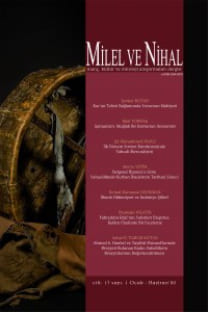İsrail’in Kudüs Politikasının Dini Nedenleri Üzerine Bir Analiz
Bilindiği üzere Müslümanlar peygamberler şehri ve Tevhit inancının iki
önemli merkezinden biri olması dolayısıyla Kudüs’ü kutsal bir kent olarak kabul
etmektedir. Yahudiler ise Kudüs’ü ilk kurucu ata olarak kabul ettikleri İbrahim
peygamber ve oğullarıyla ilişkilendirerek Babil sürgünü sonrası oluşturmaya
başladıkları kutsal tarihlerinin olmazsa olmaz parçası yapmışlardır. Bu yazıda
Yahudi kutsal metinleri ışığında Kudüs’ün Yahudiler için dini ve politik/siyasi
önemi öncelikle ortaya konmaya çalışılmıştır. Daha sonra ise ortaya konan bu
önem üzerinden gerek Yahudiler gerekse farkına varılmadan Yahudi olmayanlar
tarafından dillendirilen ve Yahudileri kutsal metinlerinde ifade edilen Kudüs
algısıyla paralellik arz eden Kudüs söylemlerinin öne çıkarılmaya devam
edilmesi durumunda Kudüs’te Yahudiler dışında başka etnik ve dini grupların
bulunmasının mümkün olmadığı tezi ileri sürülmüştür. Son olarak ise Kudüs’ün
“gökte inşa edildiği”, “arzın kapısı olduğu” ve “ölümden dirilme mekanı” olduğu
gibi söylemlerin Yahudilerin özelde Kudüs’e genelde ise tüm Filistin yurduna
sahip olma ve bunun için de Yahudi olmayanları bölgeden temizlemeye yönelik
terör politikalarına destek olmaktan başka bir işe yaramayacağı örneklerle
ortaya konmaya çalışılmıştır
Anahtar Kelimeler:
Kudüs, İsrail, İsrailoğulları, İsrail’in Kudüs Politikası
An Analaysis on the Religious Reasons of Israel’s Jerusalem Policy
As is well known, Muslims
regard Jerusalem has been a city of prophets and one of the two significant centers
of the belief of Tawhit (the oneness of God). Jews associated Jerusalem with
the Prophet Abraham and his sons whom they considered to be the first founding
ancestors and thus made Jerusalem an indispensable part of their holy history
after the exile of Babylon. This paper firstly discusses the religious and
political importance of Jerusalem in the light of Jewish scriptures.
Afterwards, considering that attached importance it is argued that it will not
be possible for those other than Jews to live in Jerusalem if the Jewish arguments
about Jerusalem maintained in the Jewish scriptures are insistently maintained
by the Jewish consciously and the non-Jewish unconsciously. Lastly, it is
clearly pointed out and exemplified that such arguments like “Jerusalem has
been established in heaven”, “Jerusalem is the gate of universe”, and
“Jerusalem is the place of resurrection” all help the Jewish Zionist terror
policies to clean out non-Jews from all the Palestinian land in order to obtain
Jerusalem in particular and the whole Palestinian land in general
Keywords:
Jerusalem, Israel, people of Israel, Israel’s policy of Jerusalem,
___
- Adam, Baki, “Kutsal Toprak, Mesih ve Terör”, Dini Araştırmalar, 7/20, 2004. Armstrong, Karen, Jerusalem : One City Three Faiths, New York : Ballenti-ne Books, 2005. Aydın, Fuat, “Yahudiler/Yahudilik Açısından Kudüs”, Eskiyeni, 37, 2018, ss. 109-125. Babylonian Talmud, Berakhoth, II, 30a, 6-9. (http://www.come-and- hear.com/berakoth/index.html) --------, Kethuboth, VIII, 111a (http://www.comeandhear.com/kethuboth/-kethuboth_111.html --------, Suka, IV, 51b, (https://juchre.org/talmud/sukkah/sukkah3.-htm#chap04) -------- Yoma, II, 21a (https://juchre.org/talmud/yoma-/yoma1.htm#21a) Besalel, Yusuf, Yahudilik Ansiklopedisi, cilt 2, İstanbul: Gözlem Yayıncılık, 2001. Josephus, Flavius, The Works Of Josephus, William Whiston (trans.), Ame-rica: Hendrickson, 1999, Antiquities of The Jews. Goldhill, Simon, The Temple of Jerusalem, Cambridge: Harvard University Press, 2005, s. 47. Mert, Rabia, Kutsal Bir Mekan Olarak Kudüs, Ankara: Eski Yeni Yayınları, 2018. Midrash Rabbah, Genesis, trc. H. Freedman, London: The Sancino Press, 1961. Montefiore, Simon Sebag, Jerusalem : The Biography, London :Weidenfeld & Nicolson 2011. Rosovsky, Nitza, City of the Great King: Jerusalem from David to the Present, Cambridge: Harvard University Press, 1996. Safrai, Shmuel “Pilgrimage”, Encylopedia of Judaizm, XVI, eds., Joseph Neusner, Alan J. Avery-Peck & William Scott Green, Leiden, Brill, 1999. The Apocrypha and Pseudepigrapha of The Old Testament in English, R. H. Charles (ed.), Oxford: Clarendon Press, 1913, II, s. 264. The Book of Jubilees, R. H. Charles (eds.), London: Adam And Charles Black, 1902. The el-Amarna, İngilizceye tercüme, Anson F. Rainey, Leiden: Brill, 2015.
- ISSN: 1304-5482
- Yayın Aralığı: Yılda 2 Sayı
- Başlangıç: 2003
- Yayıncı: Milel ve Nihal: Eğitim, Kültür ve Düşünce Platformu Derneği
Sayıdaki Diğer Makaleler
Bir Arada Yaşama Bağlamında Hz. Ömer Döneminde Kudüs
Beytülmakdis’in İşgali ve Bilgi Krizi
Kudüs Katliamı Bağlamında Haçlı Seferlerinin Sebepleri
İsrail’in Kudüs Politikasının Dini Nedenleri Üzerine Bir Analiz
Allâme Şeyhî Efendi’nin Kudüs Temalı Şitâiyyesi veyahut “Karlar İçinde Bir Kudüs Tasviri”
Tasavvuf Düşüncesinde Metafiziksel Bir Eksen Olarak Kudüs Algısı
